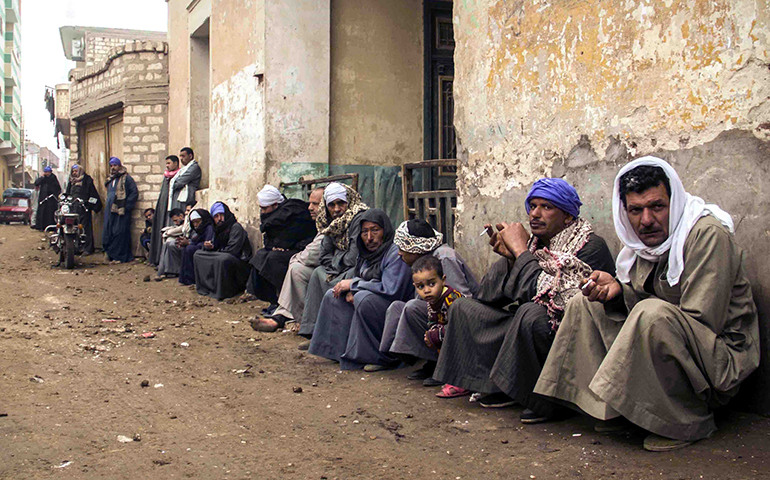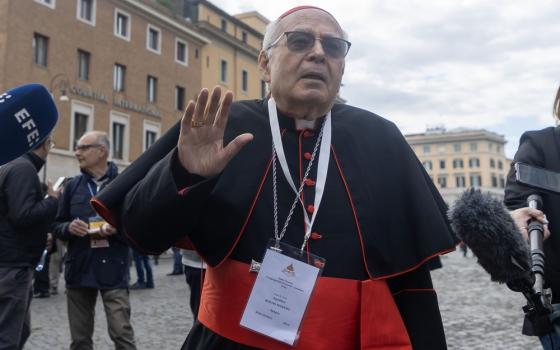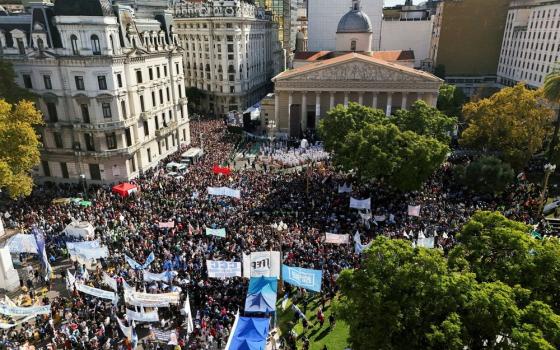
People gather in Minya, Egypt, Feb. 16, for the funeral of Coptic Christians kidnapped and killed by Islamic State rebels in Libya. (CNS/Alaa Elkamhawia, EPA)
U.S. Secretary of State John Kerry said that atrocities carried out by the Islamic State group against Yezidis, Christians and other minorities were genocide, the first U.S. declaration of genocide since Sudanese actions in Darfur in 2004.
Kerry said he was not judge and jury, but the Islamic State had self-defined itself as genocidal because of its actions against Yezidis, Christians, Shiite Muslims and other minorities.
A 66-member coalition is "working intensively to stop the spread of Daesh," Kerry said, using the Arabic acronym for Islamic State. He said the world must "marginalize and defeat violent extremists, once and for all," so they were not replaced by another extremist group with a different acronym.
"We must recognize and hold the perpetrators accountable," Kerry said in a March 17 statement that included a litany of atrocities such as rape and murder. He said Christians often were given the choice of converting to Islam or death, which was a choice between two types of death.
Kerry said military action to defeat Islamic State was important, but so were other actions. He said the coalition against Islamic State was working to strangle the group's finances and to ensure that people who fled would someday be able to return.
Reaction was swift from two organizations and a religious community with ties to the region.
Supreme Knight Carl Anderson, CEO of the Knights of Columbus, welcomed the declaration, saying it is "correct and truly historic." The Knights and In Defense of Christians released a report March 10 detailing accounts of rape, murder, torture, kidnapping and forced removals experienced and witnessed by hundreds of Christians.
"By joining its voice to that of the House of Representatives, the American people and the international community, the United States today makes clear to ISIS that its attempt to stamp out religious minorities must cease," he said in a statement. "The United States and the world are united on this and simply will not look the other way."
In Defense of Christians said in a statement that Kerry's declaration "used the word that has the moral authority to raise the international consciousness and compel the international community of responsible nations to act."
By acknowledging that religious and ethnic minorities are victims of genocide, the organization said, "the United States has done a great justice to the victims of the atrocities committed by ISIS, including the over 1,100 Christians who have been killed because of their faith."
The Iraq Coordinating Committee of the North American Dominicans' Justice and Peace Promoter's office, also hailed the declaration in a statement, saying it gives "moral weight" for the organization's years-long call for increased protection of refugees and the responsibility of countries around the world to fund and staff refugee programs to internally displaced Iraqis.
The Dominican order has been committed to justice in Iraq for more than 20 years after the United Nations adopted economic sanctions against the regime of former Iraqi leader Saddam Hussein and has sent delegations to work alongside suffering and displaced communities.
On March 14, the House of Representatives, in a bipartisan 393-0 vote, approved a nonbinding resolution that condemns as genocide the atrocities being carried out by Islamic State militants against Christians and other religious and ethnic minorities in the areas it occupies in Iraq and Syria. They gave Kerry until March 17 to decide whether to make a formal declaration of genocide.
The European Parliament passed a similar resolution in February.
State Department spokesmen had said Kerry was studying volumes of information before deciding on the genocide information. Last October, they hinted that a genocide designation was coming for the Yezidi minority in the region, but not for Christians. The comments led to a firestorm of protest from Christian groups that resulted in the congressional action.
Archbishop Joseph Kurtz of Louisville, Kentucky, president of the U.S. Conference of Catholic Bishops, asked U.S. Catholics to sign a pledge calling for an end to the slaughter of Christians and members of other religious minority groups in the Middle East.
"As a people of faith, we must convince the U.S. Department of State to include Christians in any formal declaration of genocide," he said March 14, just days before Kerry's deadline.
In his remarks, Kerry said the U.S. government did not have total access to everything going on but was basing its decision on intelligence and military sources and outside groups.
The Knights and In Defense of Christians issued their 278-page report in Washington. It contained dozens of statements collected from Feb. 22 through March 3 from witnesses and victims of atrocities carried out by Islamic State forces. The incidents included torture, rapes, kidnappings, murder, forced conversions, bombings and the destruction of religious property and monuments.
In Beirut, Syriac Catholic Patriarch Ignace Joseph III Younan commended the "courageous and clear resolution." He said adopting the resolution would "help the (world's) first Christian communities survive in their homeland of the Middle East." He made the remarks before leaving March 17 to visit Homs, Syria, his fourth visit since the liberation of the city.






